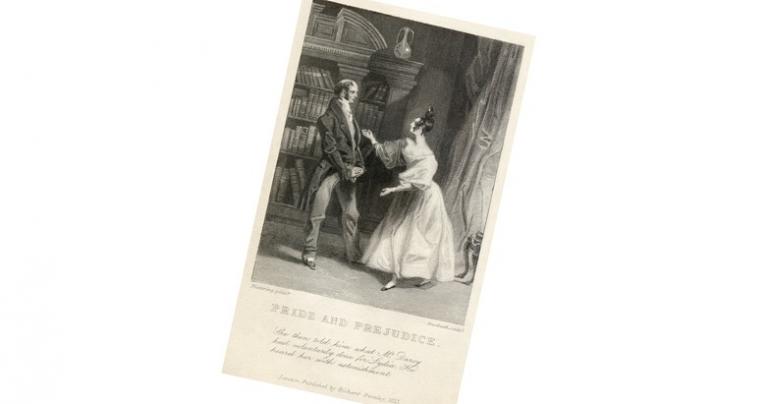 Jane Austen is the teacher we need, the thinker we ignore at our peril.
Jane Austen is the teacher we need, the thinker we ignore at our peril.
God gave humankind two voices: male and female. Refusal to listen to either is to miss half of wisdom that God makes incarnate in His image bearers.
Jane Austen does not reduce men to women or women to men. She has a sturdy and philosophically sophisticated understanding of civilization. If academia has ignored her importance as an educator, then this may be because she speaks of relationships (read Carol Gilligan) and secularists of an earlier era thought relationships inferior to their Ideas.
In the beginning, God gave us the truth while walking with us in a garden, nature made civilized. God in Three Persons did not want humanity, one person in one body, to be alone so God gave us two voices: male and female. The fool said in his heart: “there is one voice” and so ignored what women often said.
And of course, God, loving a diversity of beauty, made men and women as a group with overlapping tendencies. I am a man who thinks more like the generality of characteristics that apply to most women. I have jolly friends who are women that are womanly, but speak and think as males most often do. We cannot judge particular people with generalities, but generalities are still useful.
If there is a tendency to value enduring relationships over abstract ideas in the ethics valued by most (though not all) women, then Austen is an educator in that voice. She must not be reduced to entertainment, though she is good fun. She is wrestling with status, relationships, and how to morally negotiate status ethically.
She also is a woman in a way that no biological male can ever be. She speaks with a woman’s voice as a woman and (most important!) she is wise.
Let us attend.*
One deep problem in modern American education has been ignoring the importance of deep, family, relationships. We cut through them as my school did when they got to controversial topics and the teacher instructed the class not to tell our parents what we were learning. These schools were speaking in one voice: they ground out facts at us. They did not care what those “facts” presented as they were being presented would do to our roots, to our connections, to our ethical duties, honor, or even gratitude to our family.
Austen is our teacher of how an ethical society can live out our ideals and save our roots, connections, duties, and honor our families. Pride and Prejudice is a master work in learning to love properly. There are so many lessons for us to learn, but one comes when one sister sees that her sister will be able to marry the man she loves. Her sister will not admit her love, she is afraid of failing, but Elizabeth, the wise one, knows. All will be well.
When Elizabeth sees that her sister will gain her heart’s desire and as a result:
Elizabeth smiled.
“Lizzy, you must not do so. You must not suspect me. It mortifies me. I assure you that I have now learnt to enjoy his conversation as an agreeable and sensible young man, without having a wish beyond it. I am perfectly satisfied, from what his manners now are, that he never had any design of engaging my affection. It is only that he is blessed with greater sweetness of address, and a stronger desire of generally pleasing, than any other man.”
“You are very cruel,” said her sister, “you will not let me smile, and are provoking me to it every moment.”
“How hard it is in some cases to be believed!”
“And how impossible in others!”
“But why should you wish to persuade me that I feel more than I acknowledge?”
“That is a question which I hardly know how to answer. We all love to instruct, though we can teach only what is not worth knowing. Forgive me; and if you persist in indifference, do not make me your confidante.”
Elizabeth knows that her sister loves and will be loved in return. If her sister cannot now admit this truth, then her sister will not press. She will wait to be a confidante when her sister can tell the truth. And in doing so she teaches all teachers a truth: our love of instruction is worthless. If we press, then we gain nothing. Teaching is soul to soul instruction and depends on truth.
Our greatest teachers are always the family members who love us.
Thank you, Professor Austin.
—————-
*Let’s not make an obvious error. Men and women are human and so equal image bearers. The similarities are greater than the differences, themselves disturbed over populations. (They do not deterministic rules for individuals.)
We should not read a male or female author only through sex or even mostly through sex. My suggestion is that there is a meaningful difference in general terms between a woman’s voice and a man’s. This voice should be heard. One would not want to do this by simply reducing the “woman” author to her sex as if this is the only (or even main) reason she is read. I do not first approach Austin as a female writer, just as a great and wise writer. However, unlike other less profound characteristics, sex matters at a very deep level. When reading Plato, for example, surely his discussion of sex in Republic is influenced by his being a male with a male voice in a room of males. This is vital to notice.
I still think it worth saying that we need to hear both voices and check our reading lists to make sure this is so, because sex is a fundamental, unchanging difference in humankind that has historically been ignored.











